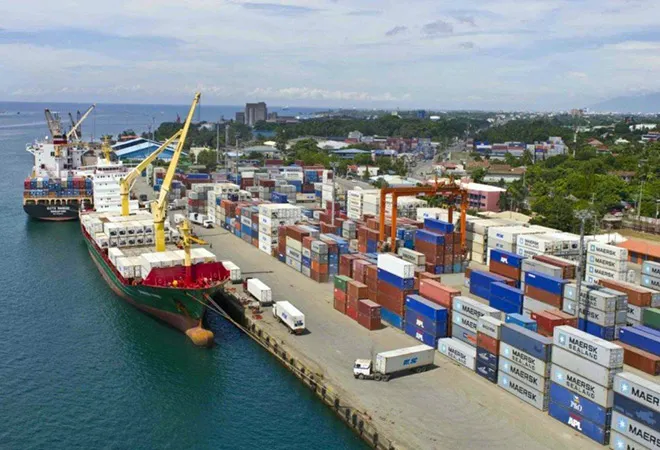
Back in June this year, Tanzanian President Dr. John Pombe Magufuli had indefinitely
suspended plans to construct what would have been East Africa’s largest deep-water port in Bagamoyo, Tanzania, after disagreeing with Chinese investors on the terms of the highly ambitious infrastructure project. Preliminary works for the US$10 billion Port project at Mbegani creek in Bagamoyo, just north of Dar es Salaam, was launched in October 2015 by his predecessor Jakaya Kikwete. But, after President Magufuli came into office in November 2015, the project took a backseat as Magufuli’s administration prioratised expansion of other Tanzanian ports such as; Dar es Salaam, Tanga and Mtwara port.
The project aims to transform Tanzania into a regional business hub and foster greater regional connectivity and integration. The Government of Tanzania in partnership with China’s largest port operator - China Merchant Holding International (CMHI) and Oman’s State Government Reserve Fund (SGRF) is responsible for the project’s implementation.
Despite President Magufuli’s best efforts to renegotiate the project’s terms with investors, after years of fruitless talks, President Magufuli declined to move forward with the project
citing ‘tough’ conditions and ‘unfavorable’ demands. The terms of the project included a ‘guarantee of 30 years and a lease of 99 years’ and that the Tanzanian Government should ‘not question whoever comes to invest there once the port is operational.’
Mr. Magufuli was
quoted telling a business delegation at State House in Dar es Salaam that, “they told us once they build the port, there should be no other port to be built all the way from Tanga to Mtwara south,” and that “they want to take the land as their own but we have to compensate them for drilling construction on that port.”
These comments help to shed some light on the harsh realities of predatory Chinese loans and practices. Chinese-funded projects are facing an increasing backlash, especially in East African countries, where most of the BRI projects are planned.
An increasing backlash
When Mr. Xi launched the Belt and Road Initiative (BRI) back in 2013, developing countries enthusiastically singed on for loans to fund big ticket infrastructure projects that would set them on the path to prosperity. But six years on, China is facing a backlash as new governments are starting to cancel and renegotiate contracts, given the weight of Chinese debt.
The first example of an African country announcing the cancellation of a Chinese One Belt One Road (OBOR) project came in October 2018, when Sierra Leone scrapped plans to build a China-funded US$318 million airport (the proposed Mamamah airport), outside its capital, Freetown. After much deliberation and considerations, Sierra Leone’s President Julius Maada Bio
opined that “it is uneconomical to proceed with the construction of the new airport when the existing one is grossly underutilised.”
The next backlash came against the
proposed US$ 2 billion Lamu coal-fired plant to be built by Chinese firms along with a Kenyan consortium. This was supposed to be Kenya’s and East Africa’s first coal plant. A Kenyan tribunal – the National Environment Tribunal – faulted the Chinese-backed power plant for
failing to adequately conduct a thorough assessment of the plant’s impact on Lamu, a historic archipelago and UNESCO heritage site, and cited insufficient and unclear plans for handling and storing coal ash. Kenya develops most of its energy from hydroelectric and geothermal power. As a result, environmentalists protested against the project since its inception by arguing that coal has no place in a country that develops its energy from other sources.
Other examples of resistance to Chinese-funded projects in Africa includes, dispute over the setting up of a fishmeal factory in
Gambia, and fear of debt-trap and dominance of Chinese contractors in
Zambia.
The ‘debt trap’ narrative continues to dominate the media space, accusing China of providing unsustainable loans to developing countries that are now struggling to pay them back. The most widely cited case is that of Hambantota port in Sri Lanka.
While it is certainly important to engage in nuanced debates on African debts that is not driven by
‘Chinaphobia’, one cannot deny the opaque nature of most Chinese contracts that are mostly not visible to or available in the public domain for scrutiny. Moreover, the opacity of the coasts and terms of Chinese loans makes it difficult for countries to conduct risk assessment of the projects.
Tanzania steps up to China
Although there were
various rumors doing the rounds that negotiation for the Bagamoyo port project were still ongoing despite the project being stalled, the Tanzanian Government has finally
issued an ultimatum to the Chinese investor (China Merchants Holding International) in the USD 10 billion project to either work with Tanzania Ports Authority’s new terms and conditions or the project would go to another bidder. There are 5 revised clauses which have been added.
First, the Chinese investor has now been offered a lease of 33 years instead of the 99 years one asked for. Second, the investors will not be exempted from any taxes and will be subjected to all taxes designed by the Tanzania Revenue Authority. Third, the investors would need to take Tanzanian Government’s approval before starting and running any new business within the ports facilities. Fourth, there will be no special status for the investors and that it would have to pay the market rate for water or electricity. Lastly, the Government of Tanzania can develop other ports to be in direct competition with Bagamoyo.
Now for the Bagamoyo port project to move into the execution stage, the Chinese firm would first need to agree in principle with the Tanzanian Government’s new terms and conditions. This Bagamoyo port conundrum and the other examples of backlash faced by China in countries like Kenya, Sierra Leone, Gambia, etc., shows that there is a growing relaisation among Africans of what’s beneficial for their respective countries. At a time when African countries’ are taking charge of their own destiny, Chinese investors cannot simply throw their weight around and expect to get away with it.
The views expressed above belong to the author(s). ORF research and analyses now available on Telegram! Click here to access our curated content — blogs, longforms and interviews.



 Back in June this year, Tanzanian President Dr. John Pombe Magufuli had indefinitely
Back in June this year, Tanzanian President Dr. John Pombe Magufuli had indefinitely  PREV
PREV


